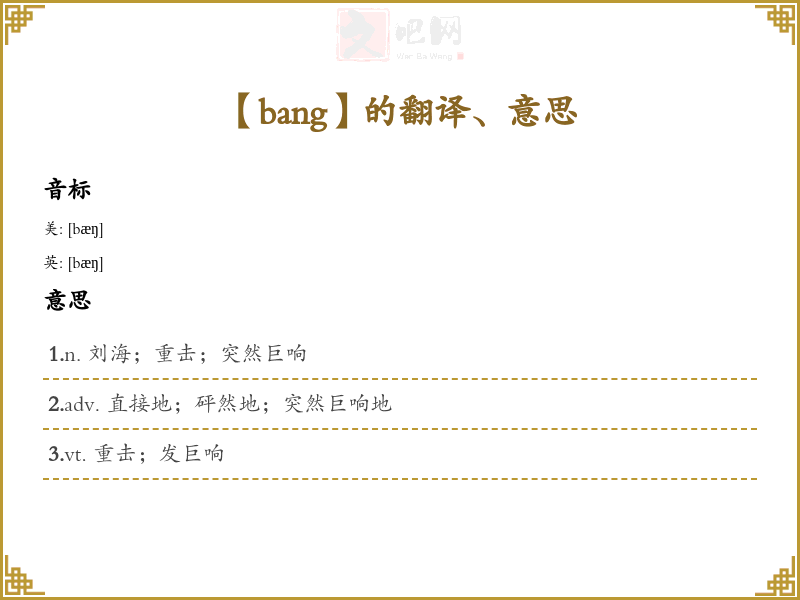【bang】的翻译、意思
时间: 2025-04-26 13:18:05
【bang】怎么读
美:[bæŋ]
英:[bæŋ]
【bang】是什么意思、字义解释
1. n. 刘海;重击;突然巨响
2. adv. 直接地;砰然地;突然巨响地
3. vt. 重击;发巨响
4. n. (Bang)人名;(英、乍)班;(芬、德、丹)邦
【bang】的详细解释
英文单词学*与分析:[bang]
1. 基本定义:
-
字面意思:
- “Bang” 最基本的意思是指一种突然的、响亮的声响,通常与爆炸或冲击有关。它也可以作为动词,意指迅速地撞击或发出响亮的声音。
-
词性:
- 名词(noun):表示响声或冲击。
- 动词(verb):表示发出响声或撞击。
2. 词源与起源:
-
词源分析:
- “Bang” 的词源可能来自于中世纪英语中的“bang”或“bange”,这些词表示“撞击”或“响声”。没有明确的词根、前缀或后缀。
-
历史背景:
- “Bang” 首次在文学中出现的确切时间不详,但其作为表示响声的用法在17世纪的英语中已被记录。
-
课本:
- 在**的英语教材中,特别是初中和高中阶段,可以在与声音或动作相关的单元中找到该词。
- 在牛津和美国的教材中,通常在初级到中级的阅读材料中出现,涉及日常对话和情景对话。
3. 使用场景:
-
正式与非正式语境:
- 正式:在科学或技术文献中,可能用于描述爆炸或突然的声音。
- 非正式:在日常交流中,常用于形容突然的声响,如“他关门时发出了一声bang”。
引证解释:
- "He banged the door shut."(他猛地关上门。)出处:日常对话。
-
特殊场合:
- 法律:在某些法律文本中,可能提到“bang”作为警告信号或暴力行为的描述。
- 科学:用于描述物理现象,如“the bang of a gun”来形容枪声。
4. 示例句子:
-
The fireworks went off with a loud bang.
烟花响起,伴随着一声巨响。 -
She banged her fist on the table in frustration.
她因沮丧而用拳头猛击桌子。 -
There was a bang from the kitchen when the pot fell.
厨房传来一声巨响,锅掉了下来。 -
The car engine made a strange bang before it stalled.
汽车发动机在熄火前发出奇怪的声响。 -
He heard a bang outside and went to investigate.
他听到外面有一声巨响,便去查看。
5. 同义词与反义词:
-
同义词:
- "Crash":通常指撞击声,强调力量和破坏。
- "Boom":通常指低沉而有力的响声,常与爆炸或雷声有关。
-
反义词:
- "Silence":完全没有声音,与“bang”的含义相反。
- "Whisper":轻声细语,表示非常小的声音,与“bang”的响亮相对。
. 学方法:
- 音标记忆法:
- “Bang”的音标为 /bæŋ/,可以通过多次重复并结合发声来加深记忆。可以尝试发出“bang”声来增强记忆,将其与响亮的声响相联系。
7. 关联词汇:
- 常与“bang”一起使用的词汇包括:
- "Bang on"(继续敲打),
- "Bang for your buck"(物有所值),
- "Bang out"(快速完成),
- "Big bang"(大爆炸)。
通过以上分析,可以全面理解“bang”这个单词的含义、用法及其在不同语境中的应用。
【bang】例句
1、[N-COUNT/SOUND] A bang is a sudden loud noise such as the noise of an explosion. (突然的) 巨响
-
例:I heard four or five loud bangs.我听到四五声巨响。
-
例:She slammed the door with a bang.她砰地一声关上门。
2、[V-I] If something bangs, it makes a sudden loud noise, once or several times. 砰然作响
-
例:The engine spat and banged.引擎发出劈啪声和砰砰巨响。
3、[V-T/V-I] If you bang a door or if it bangs, it closes suddenly with a loud noise. 砰地关上
-
例:...the sound of doors banging.…砰砰的关门声。
-
例:All up and down the street the windows bang shut.整条街的窗户都砰砰关上了。
4、[V-T/V-I] If you bang on something or if you bang it, you hit it hard, making a loud noise. 大声猛击
-
例:We could bang on the desks and shout till they let us out.我们会大声猛拍桌子,大声喊叫,直到他们放我们出去。
5、[V-T] If you bang something on something or if you bang it down, you quickly and violently put it on a surface, because you are angry. (因生气而) 猛然用力放
-
例:She banged his dinner on the table.她猛地用力把他的晚饭砸在桌上。
6、[V-T] If you bang a part of your body, you accidentally knock it against something and hurt yourself. (无意中) 撞伤
-
例:She'd fainted and banged her head.她晕了过去,撞伤了头部。
7、[N-COUNT] Bang is also a noun. 撞伤
-
例:...a nasty bang on the head.…头部可恶的撞伤。
8、[V-I] If you bang into something or someone, you bump or knock them hard, usually because you are not looking where you are going. (不小心) 猛撞上
-
例:I didn't mean to bang into you.我不是故意撞你的。
9、[[强调]] You can use bang to emphasize expressions that indicate an exact position or an exact time. 正好
-
例:...bang in the middle of the track.…在路的正中央。
10、[[PHR after v]] If something begins or ends with a bang, it begins or ends with a lot of energy, enthusiasm, or success. 轰轰烈烈地
-
例:Her career began with a bang in 1986.她的事业在1986年轰轰烈烈地开始了。
